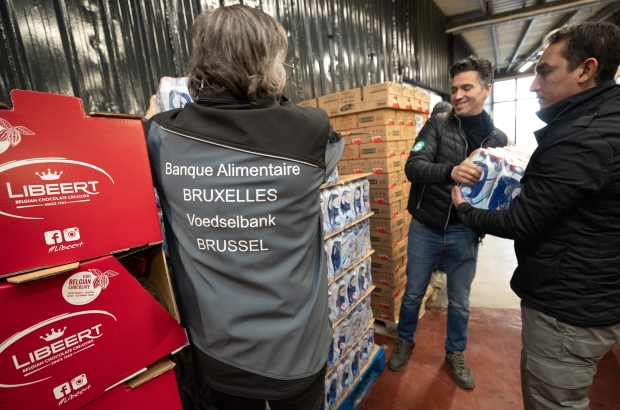- Daily & Weekly newsletters
- Buy & download The Bulletin
- Comment on our articles
Belgium's food banks call out for increased help
The number of people in Belgium relying on food banks remained high last year, and this followed significant increases over the past decade, according to the Belgian Federation of Food Banks (FBBA), which is calling on the new federal government for more financial aid.
In 2024, about 209,000 Belgian residents sought help each month from one of the 698 associations affiliated with food banks. This was a slight decrease over the 2023 figure, when the number of beneficiaries per month was about 214,000.
However, the number of people benefiting from food banks has shot up by 50% over the past 10 years, the FBBA said: “Faced with inflation, more and more people in need are on their knees.”
In 2024, approximately 26,000 tonnes of food were distributed to member associations, the equivalent of some 52 million meals.
At the same time, the federation said that donations from the food industry are in decline.
To ensure the weekly distribution of five balanced meals to each beneficiary, the FBBA had to purchase 1,600 tonnes of food, thanks to financial support from private and public donors.
The FBBA said it was pleased with the new federal government’s plans to introduce initiatives to stimulate more food donations, including tax incentives.
But it called on the government to extend financial compensation for the reduced EU Social Fund Plus (ESF+) budgets of 2024 and 2025, to 2026 and 2027.
“More than ever, we need support from the businesses, individuals, and public authorities,” said FBBA president Piet Vanthemsche.
“Whether it is food donations, financial contributions, or long-term volunteering, every bit of help counts to support families in need.”
One foodbank volunteer, Karim Battah, told RTBF that food donations were becoming less frequent, with the European Union, the biggest donor, also significantly reducing its food deliveries.
Marc Mertens, FBBA managing director, said that one reason is that currently it is cheaper for businesses to get rid of the food than to donate it.
Today, one in five Belgians is at risk of poverty and social exclusion, the FBBA added, saying its volunteers distribute food free of charge to those in need.
The food banks story began in 1967 in the United States, when entrepreneur and activist John Van Hengel met a widowed mother of 10 children who was looking for food in rubbish bins. Inspired to act, he created the concept of food banks - going to supermarkets to collect surplus food, which he donated to people in need.
The project spread around the world, arriving in Belgium in 1985, where the FBBA said “demand for food aid was unfortunately high”.
The European Social Fund Plus (ESF+), the EU’s main instrument for investing in people and supporting the implementation of the European Pillar of Social Rights, has a €142.7 billion budget for 2021-2027.
The EU will invest €1.3 billion in ESF+ funding in Belgium to promote social inclusion, employment support, up-and reskilling and modernisation of education and training policies and systems.

















